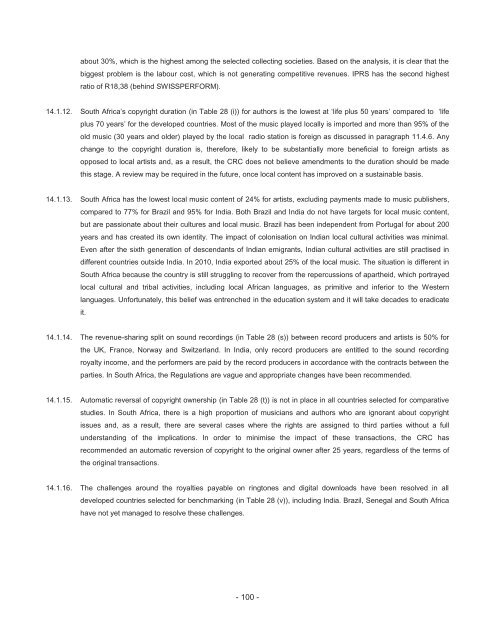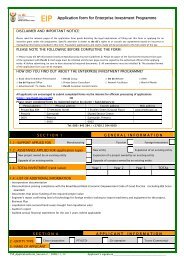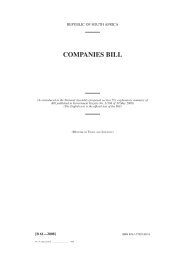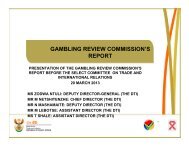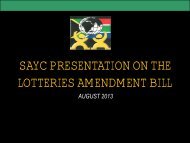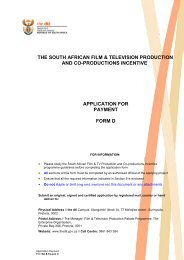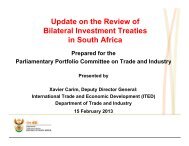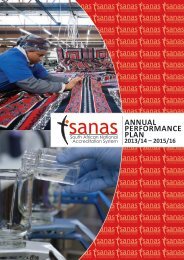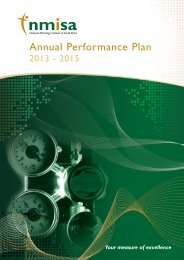Copyright Review Commission Report - ICT Law and Regulation ...
Copyright Review Commission Report - ICT Law and Regulation ...
Copyright Review Commission Report - ICT Law and Regulation ...
- No tags were found...
Create successful ePaper yourself
Turn your PDF publications into a flip-book with our unique Google optimized e-Paper software.
about 30%, which is the highest among the selected collecting societies. Based on the analysis, it is clear that thebiggest problem is the labour cost, which is not generating competitive revenues. IPRS has the second highestratio of R18,38 (behind SWISSPERFORM).14.1.12. South Africa’s copyright duration (in Table 28 (i)) for authors is the lowest at ‘life plus 50 years’ compared to ‘lifeplus 70 years’ for the developed countries. Most of the music played locally is imported <strong>and</strong> more than 95% of theold music (30 years <strong>and</strong> older) played by the local radio station is foreign as discussed in paragraph 11.4.6. Anychange to the copyright duration is, therefore, likely to be substantially more beneficial to foreign artists asopposed to local artists <strong>and</strong>, as a result, the CRC does not believe amendments to the duration should be madethis stage. A review may be required in the future, once local content has improved on a sustainable basis.14.1.13. South Africa has the lowest local music content of 24% for artists, excluding payments made to music publishers,compared to 77% for Brazil <strong>and</strong> 95% for India. Both Brazil <strong>and</strong> India do not have targets for local music content,but are passionate about their cultures <strong>and</strong> local music. Brazil has been independent from Portugal for about 200years <strong>and</strong> has created its own identity. The impact of colonisation on Indian local cultural activities was minimal.Even after the sixth generation of descendants of Indian emigrants, Indian cultural activities are still practised indifferent countries outside India. In 2010, India exported about 25% of the local music. The situation is different inSouth Africa because the country is still struggling to recover from the repercussions of apartheid, which portrayedlocal cultural <strong>and</strong> tribal activities, including local African languages, as primitive <strong>and</strong> inferior to the Westernlanguages. Unfortunately, this belief was entrenched in the education system <strong>and</strong> it will take decades to eradicateit.14.1.14. The revenue-sharing split on sound recordings (in Table 28 (s)) between record producers <strong>and</strong> artists is 50% forthe UK, France, Norway <strong>and</strong> Switzerl<strong>and</strong>. In India, only record producers are entitled to the sound recordingroyalty income, <strong>and</strong> the performers are paid by the record producers in accordance with the contracts between theparties. In South Africa, the <strong>Regulation</strong>s are vague <strong>and</strong> appropriate changes have been recommended.14.1.15. Automatic reversal of copyright ownership (in Table 28 (t)) is not in place in all countries selected for comparativestudies. In South Africa, there is a high proportion of musicians <strong>and</strong> authors who are ignorant about copyrightissues <strong>and</strong>, as a result, there are several cases where the rights are assigned to third parties without a fullunderst<strong>and</strong>ing of the implications. In order to minimise the impact of these transactions, the CRC hasrecommended an automatic reversion of copyright to the original owner after 25 years, regardless of the terms ofthe original transactions.14.1.16. The challenges around the royalties payable on ringtones <strong>and</strong> digital downloads have been resolved in alldeveloped countries selected for benchmarking (in Table 28 (v)), including India. Brazil, Senegal <strong>and</strong> South Africahave not yet managed to resolve these challenges.- 100 -


